Islamic Studies Program

Gain Insight and Understanding into Islam and Muslim Cultures
Islam and Muslim communities are a rich part of local Michigan history and an integral part of our global story. In the program, you can build critical knowledge across disciplines, learn relevant languages and develop strong cross-cultural skills. These competencies are needed in healthcare, government, urban planning and all fields that value and serve multicultural and multireligious communities. Following the University's Jesuit and Mercy vision, Islamic Studies is one route to understand our interconnected humanity and develop solutions to create a more just world.
This interdisciplinary minor brings together the worlds of culture, science, art, theology, history and philosophy to show the diverse ways religion permeates our lives. Courses expose students to major historical events and figures, intellectual traditions and cultural expression relevant to Muslim devotional life and socio-political engagement in a diverse world.
Examples of projects in our program include:
- Virtual exhibit of Indonesian modern art
- Presentation on challenges for Muslims' equal access to healthcare
- Research paper on the Qur'anic theme of divine mercy
- Report on the role of Islam in modern Albanian statecraft
- Multimedia website on American Muslim culinary practices
Islamic Studies Minor
The Islamic Studies minor offers an approach to the study of Islam and Muslims that examines principal beliefs, core values, practices and cultural expression. Courses provide introductory as well as critical, in-depth analyses of key themes in the study of Islam across several disciplinary methods. Students not only investigate religious sciences such as theology, law and philosophy but also the deep relationship between Islam and the arts, science and technology, medicine, economics and government. Altogether students build a rich understanding of the history and contemporary dynamics of Islam as a multiracial, multivocal and transnational tradition in a multifaith and interconnected world. The minor investigates the ultimate priorities, purposes and passions of a living religion with significance to the greater Detroit area and import in global history and our collective future.
The minor is housed in the College of Humanities, Arts & Social Sciences.
Additional Academic Offerings
-
Language Offerings
Language Study allows you to study Islam through texts, media and engagement with contemporary communities beyond English. Arabic is integrated into the Islamic Studies minor, and classes are regularly offered throughout the year. In addition, you can request to have other languages offered to expand your study of Islam and Muslim communities through the Language and Cultural Training Program. For example, you can study Persian to read epic poetry or Turkish to understand political speeches.
-
Graduate Level Study: Master of Arts in Liberal Studies
The Islamic Studies program does not currently offer a graduate level program. However, the study of Islam can be pursued through the interdisciplinary Master of Arts in Liberal Studies (MALS) program. The MALS is for those who wish to explore and understand the social, cultural and humanistic dimensions and context of today's world and their own individual lives. Graduate studies are offered in two tracks: a custom designed curriculum, shaped by the student and their academic mentor, or through a religious studies concentration.
-
Off Campus Learning Opportunities
To expand our knowledge beyond a traditional classroom setting, the Islamic Studies program encourages students to pursue learning off campus. The program supports internships with local Muslim organizations, such as a charity or scholarly center, with the support of a faculty member. Beyond our city, students can pursue study abroad opportunities to learn from and engage with Muslim communities and historical sites outside the United States. Get in contact to learn more!
-
Related Programs in the Region
The Greater Detroit Region is rich with scholarly projects that support the study of Islam and Muslim communities. Students at University of Detroit Mercy can not only learn from our peer institutions but reach out to collaborate!
Arab American National Museum
Since opening in 2005, the Arab American National Museum's (AANM) mission has been to document, preserve and present the history, culture and contributions of Arab Americans. Their exhibitions cover the Arab world and the history of Arab Americans from the first immigrants who arrived in the late 19th century to today. AANM has one of the most extensive archives of Arab American historical documents, oral histories and artifacts and actively collects Arab American art. As part of the larger, religiously diverse landscape of Arab American history, AANM contains important historical material in their museum and library of Muslim history in the United States.
Charles H. Wright Museum of African American History
Opened in 1966, The Wright Museum aims to open minds and change lives through the exploration and celebration of African American history and culture. Its programming and exhibits share knowledge about the adversity and achievement of African American history to inspire greater understanding, acceptance and unity. The museum explores the diverse religious identities of African and African diaspora peoples, including the historic African American Muslim communities in Detroit and figures such as Malcolm X and Elijah Muhammad.
Detroit Muslim Storytelling Project
he Dream Storytelling Project, also known as the Detroit Muslim Storytelling Project, is an oral history initiative launched in 2020 by the neighborhood revitalization association Dream of Detroit, which works closely with the Muslim Center Mosque and Community Center. This project builds and disseminates knowledge about the history and scope of African-American Muslim community leadership in Detroit. It shows how a diverse group of Detroit residents are developing informed solutions to the city’s enduring problems of population loss, economic decline, and municipal neglect and while producing vibrant social networks and community life.
Halal Metropolis
Hosted by University of Detroit – Dearborn, Halal Metropolis is a series of exhibitions that explores the facts, fictions and imaginaries of the Muslim population(s) in Detroit and Southeast Michigan as viewed through historical and archival research, documentation of current conditions, and explorations of future desires. The Halal Metropolis alludes to the established and growing Muslim population in Detroit and its metro area, one of the largest and most diverse Muslim populations in the U.S., whose visibility is both pronounced and extremely present in the city, yet whose narrative seems unusually silent in the larger Detroit story.
Khamseen: Islamic Art History Online
Hosted by the University of Michigan Ann Arbor, Khamseen is a free and open-access online platform of digital resources to aid the teaching of Islamic art, architecture, and visual culture. In its initial stage, the platform provides original multimedia content developed by scholars from across the field of Islamic art, which is intended to aid educators in the creation of an interactive learning environment and to contribute to new ways of teaching in general, bringing new voices, perspectives and materials into our classrooms.
Michigan State University (MSU) Muslim Studies Program (MSP)
Established at MSU in 2006, MSP coordinates research, teaching and outreach about Muslim societies and states. Additionally, it organizes speakers, workshops and conferences on a wide range of topics that reflect the rich diversity of Muslim communities around the world. It is an interdepartmental and interdisciplinary center.
University of Michigan Ann Arbor Global Islamic Studies Center
The Global Islamic Studies Center (GISC) serves students, faculty, and the extramural community by promoting the understanding of global Islamic culture and Muslim societies worldwide, through pioneering research, innovative instruction, and a commitment to building partnerships on the University of Michigan campus and beyond.
Events
The Islamic Studies Program hosts events throughout the year that show the connections across our university disciplines, from Engineering to English or from Women and Gender Studies to Architecture. Islamic Studies ties all these areas together in helping us to think of religion and religious communities as a dynamic part of our world. We host scholars sharing cutting edge research as well as local leaders in media, the arts, religious life, and more to learn from their contributions to our region.
Collaborations and suggestions are always welcome; be in contact today to propose an event for the academic year.
-
Previous Events
Co-Sponsorship: Resisting Genocide: A Discussion about Palestine & Lebanon
March 12, 2025
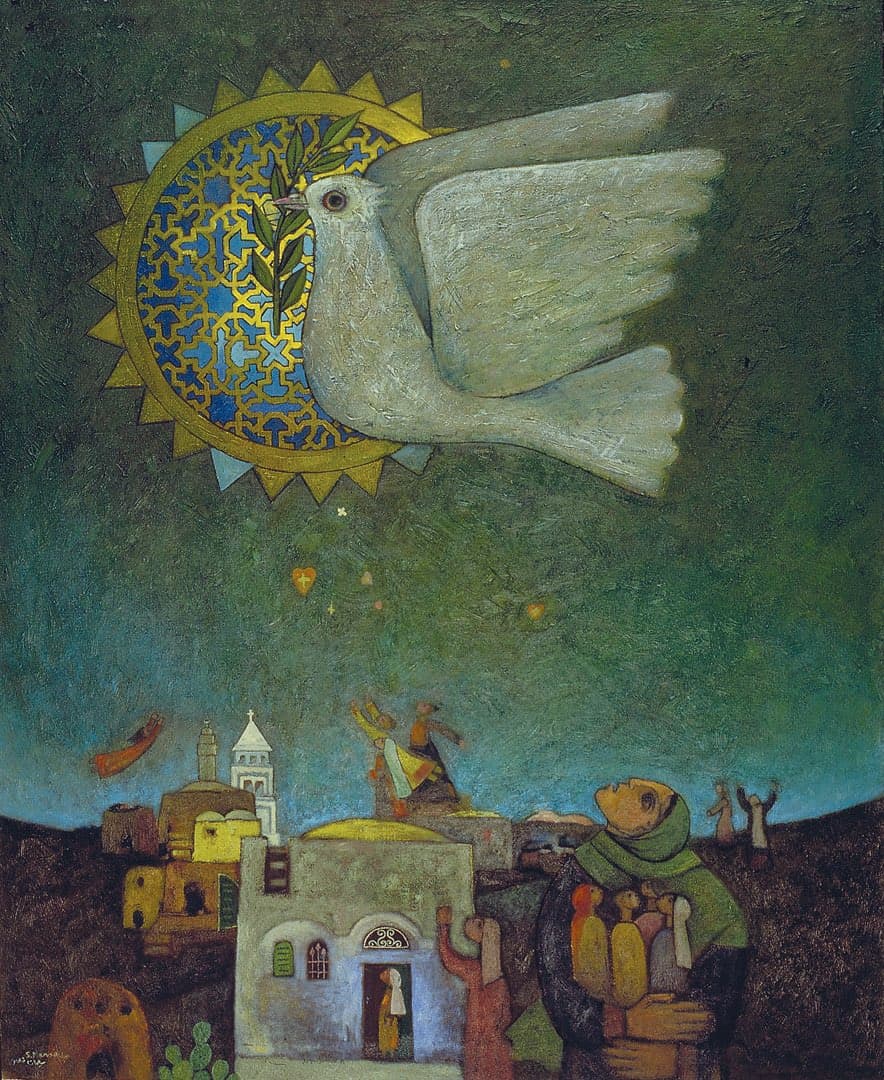
Event Image: Sliman Mansour, "Hope" (1985). Oil on canvas.
The University Honors Program hosted their annual panel on the topic "Resisting Genocide" to discuss the challenge of confronting contemporary injustices related to war in the Levant. Invited panelist Lexis Zeidan, co-founder of the Uncommitted National Movement, shared her experience organizing voters to cast "uncommitted" votes in the Democratic primaries as a protest against U.S. policy in the Gaza war. The movement began in Michigan and grew to over half a million voters nationwide. Faculty, staff and student panelists also shared their reflections on the impact of global conflict on their personal lives and local communities, strategies to organize for social justice at home and abroad, and the connections to Jesuit and Mercy values to expand the discussion on campus.
This event was co-sponsored by University Ministry and the Islamic Studies Program. Student co-sponsors include the Students for Justice in Palestine, the Egyptian Student Association, the Iraqi American Union, the Feminist Coalition, the Chaldean American Student Association, the Yemen Student Association, the Syrian Student Association and the Muslim Student Association.
Stuck in the In-Betweens: Poetry with Reem Abou-Samra
Nov. 14, 2024
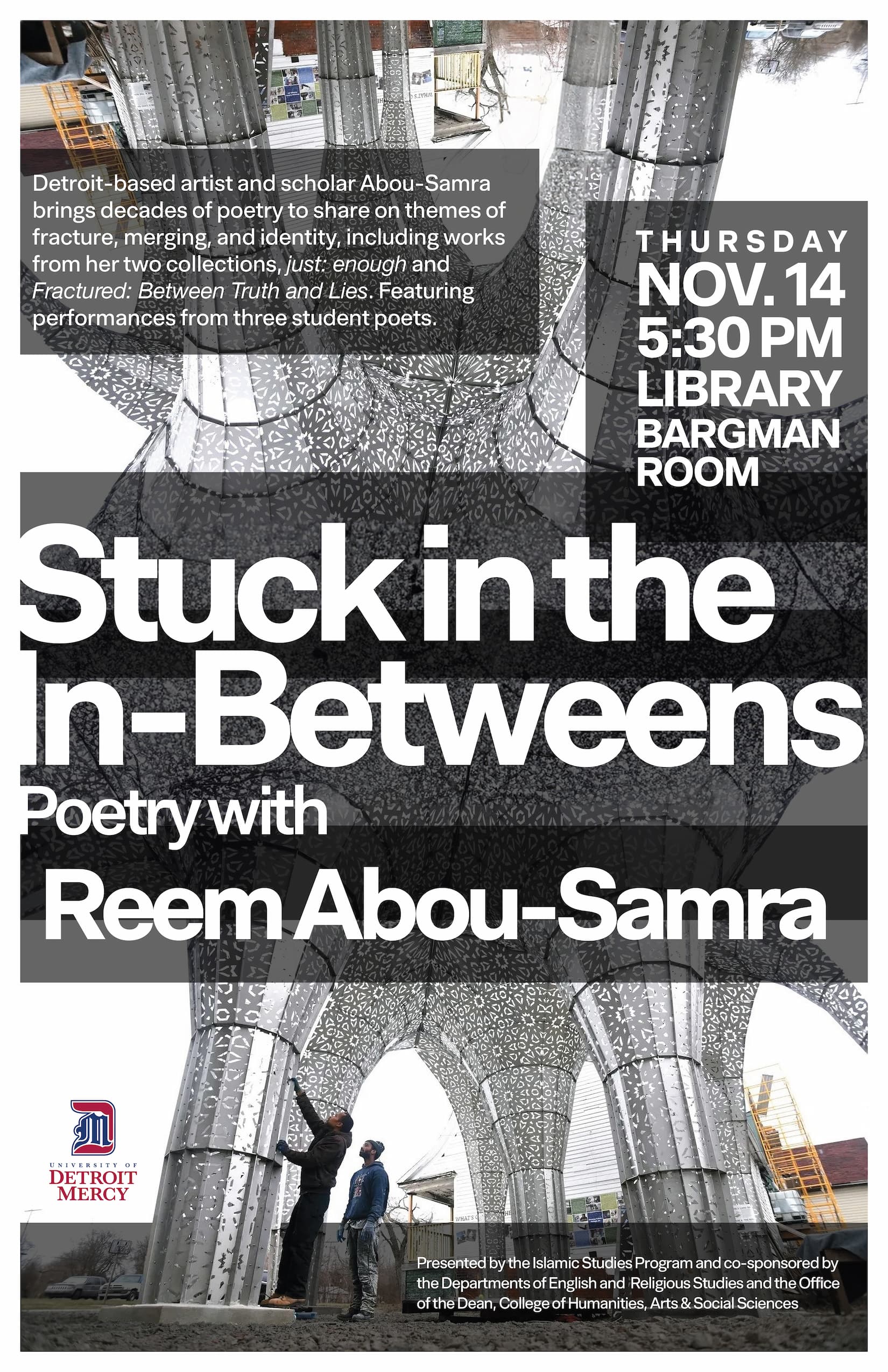
Detroit-based poet Reem Abou-Samra brings decades of poetry to share on themes of fracture, merging and identity. Join Abou-Samra for an evening of poetry, including works from her two collections — just: enough and Fractured: Between Truth and Lies. Between her sets, alumna Zahra Kanji and UDM students Jenna Saker and Tasnim Uddim will perform their own original works.Through her poetry, Abou-Samra shares her experiences and reflections as an activist, mother, Muslim and Syrian-American. She has been performing for two decades in Detroit and supports open mics and other opportunities for artists in the region. In addition, she is a scholar of Political Science, Middle Eastern Studies and Islamic Studies and currently teaches at University of Michigan’s Ann Arbor and Dearborn campuses.
This event was co-sponsored by the Office of the Dean, College of Humanities, Arts & Social Sciences; Department of English; and Department of Religious Studies.
See coverage of the event on CHASS Social Media
Building Community Power Through Journalism: A Conversation with Nargis Hakim Rahman
Sept. 24, 2024
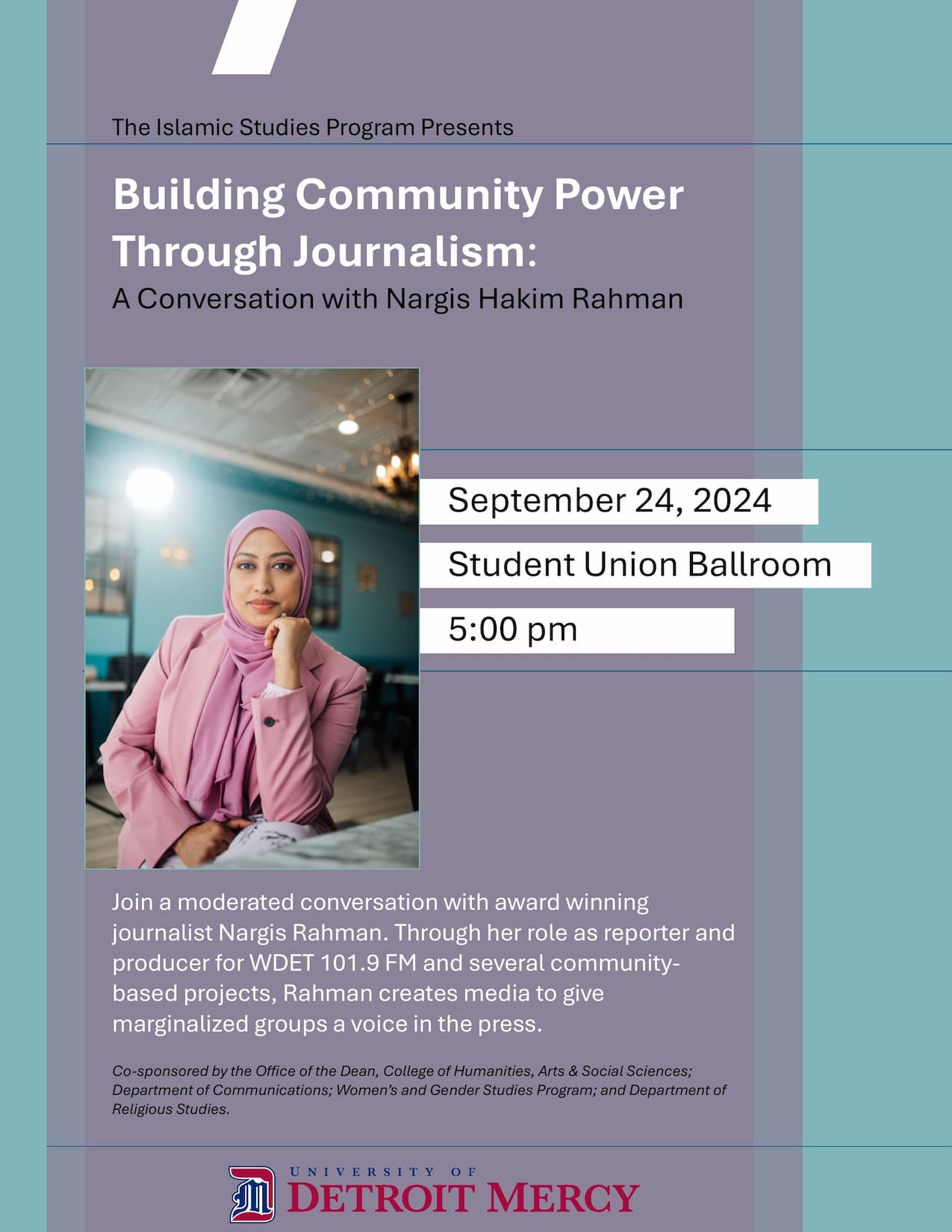
In her role as reporter and producer for WDET 101.9 FM and several community based projects, Nargis Hakim Rahman held a conversation to discuss how she creates media to give marginalized groups a voice in the press.
Rahman is an award-winning Bangladeshi American Muslim journalist and writer. She graduated from Wayne State with a bachelor’s degree in journalism, and a psychology minor. Her work has appeared in Huffington Post, NPR, YES Magazine!, Haute Hijab, Tostada Magazine, Eater, Model D, Detroiter Magazine, The Muslim Observer, Brown Girl Magazine, Metro Detroit Mommy, and more and is a member of the Asian American Journalists Association. She has held past fellowships with the South Asian American Digital Archive, International Women’s Media Foundation, The Gerontological Society of America (GSA) and the Journalists Network on Generations and Feet 2 World about foodways. Currently, she is the Civic Reporter and a producer for local NPR station WDET at 101.9 FM.
This event was co-sponsored by the Office of the Dean, College of Humanities, Arts & Social Sciences; Department of Communications; Women’s and Gender Studies Program; and Department of Religious Studies
Un/committed: Muslims’ Electoral Preferences & Voting Behavior in the US
Monday, April 8, 2024
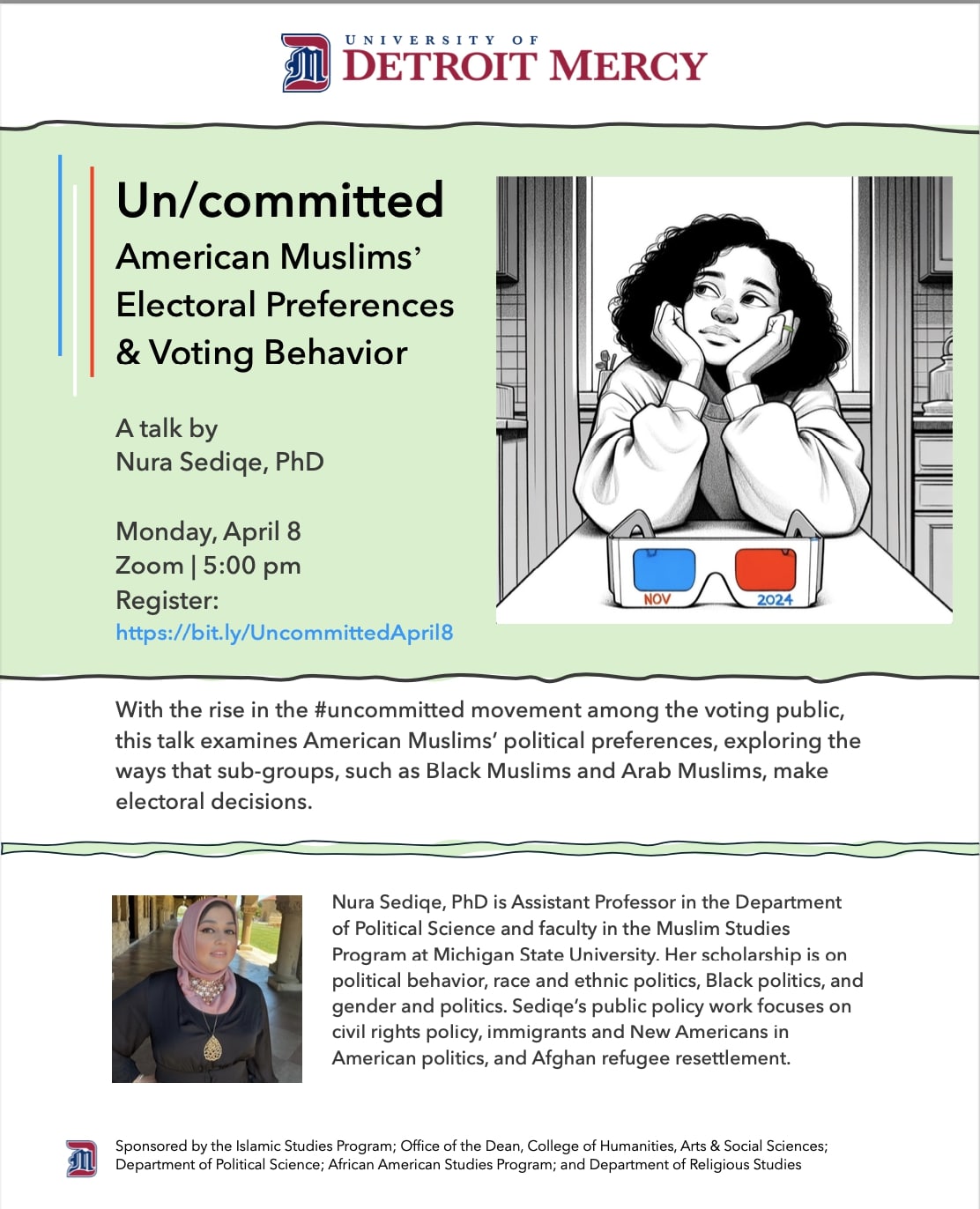
With the rise in the #uncommitted movement among the voting public in 2024, Nura Sediqe, Ph.D., gave a lecture which examined American Muslims’ political preferences, exploring the ways that sub-groups, such as Black Muslims and Arab Muslims, make electoral decisions.
Dr. Nura Sediqe is assistant professor of Political Science and faculty in the Muslim Studies Program at Michigan State University. She conducts research on political behavior, specialized in race and ethnicity, gender and Black politics. Her public policy work focuses on civil rights policy, immigrants and new Americans in American politics and Afghan refugee resettlement.
This event was co-sponsored by the Office of the Dean, College of Humanities, Arts & Social Sciences; Department of Political Science; African American Studies Program; and Department of Religious Studies.
Co-Sponsorship: A Catholic Priest's Reflection on War in the Holy Land – A Talk by David Neuhaus, S.J.
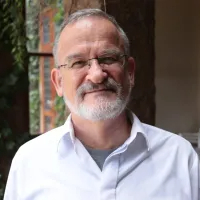 Feb. 12, 2024
Feb. 12, 2024The Carney Latin American Solidarity Archive (CLASA) hosted Neuhaus as he reflected on contemporary events unfolding in the Holy Land, including Gaza, the West Bank, and Israel. David Mark Neuhaus, S.J. is a member of the Jesuit community in the Holy Land. He is emeritus Latin Patriarchal Vicar for Hebrew Speaking Catholics, Migrants and Asylum Seekers in Israel. He has many scholarly publications as well as articles in America magazine. He has resided and worked in Jerusalem and in Johannesburg.
This event was co-sponsored by the Islamic Studies Program, Office of Mission Integration, the Arthur J. McGovern Catholic Studies Program, the Department of Religious Studies.
Co-Sponsorship: Under Pressure: Women in Afghanistan, Iran and the USAMarch 14, 2023
The Department of Political Science at Detroit Mercy hosted a discussion in honor of International Women’s Month. It focused on the comparative status of women in Afghanistan, Iran and the United States in light of recent events and developments in these countries in light of contemporary socio-political dynamics.
Discussion leaders 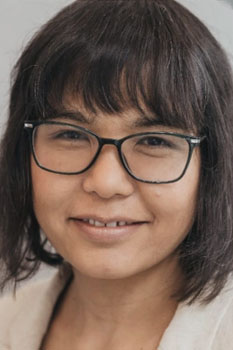
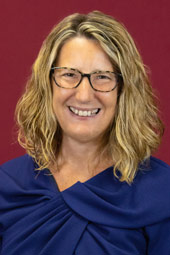
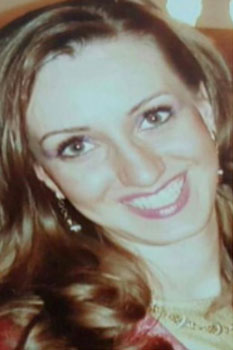
Khatera Alizada, Ph.D. Jocelyn Boryczka, Ph.D. Khadijeh Niloufar Salimi, Ph.D.
The discussion was led by three local experts:- Khatera Alizada, Ph.D. is a member of the Board of Directors at Bamyan Foundation and a research affiliate at Worcester Polytechnic Institute. She has worked with the Feminist Majority Foundation, Middle East Institute, the Norwegian Refugee Council and the Afghanistan Independent Human Rights Commission.
- Jocelyn M. Boryczka, Ph.D. is the Dean of Detroit Mercy's College of Humanities, Arts & Social Sciences and is Professor of Political Science. Boryczka served as editor and co-editor of New Political Science: A Journal of Politics & Culture, has written two books about women’s education.
- Khadijeh Niloufar Salimi serves as an adjunct faculty at Old Dominion University and Christopher Newport University where she teaches courses in Politics of the Middle East, Global Social Issues and Comparative Politics. Salimi's research focuses on civil disobedience, social movements, LGBTQ rights movement, the Women’s Suffrage Movement in the US and the Women’s Suffrage Movement in Iran.
This event was co-sponsored by the Islamic Studies Program, the Political Science Department, and the Women's and Gender Studies Program.
Co-Sponsorship: The Trials of Spring - A Film Screening and DiscussionMarch 1, 2023
The Women’s and Gender Studies Program presented a screening and discussion of Fork Films’ documentary: The Trials of Spring. The film follows three Egyptian activists in their fight to ensure that women were included in the Arab Spring movement of 2011. The screening will be followed by a discussion.
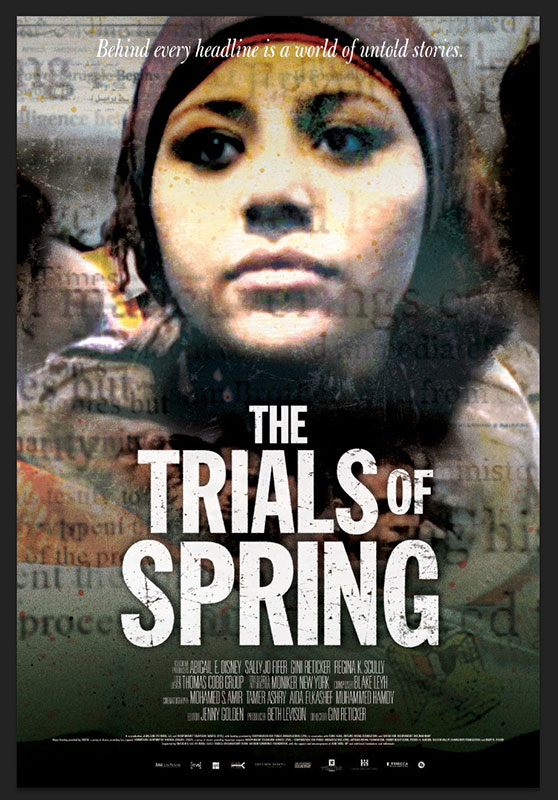
Islamic Studies faculty member Reem Abou-Samra was one of the scholarly discussants for the film.
This event was co-sponsored by the Islamic Studies Program, the Political Science Department, and the Muslim Student Association.
The Sound Arts: A Spiritual Practice in Islam with Tazeen & LuFukiNov. 11, 2022
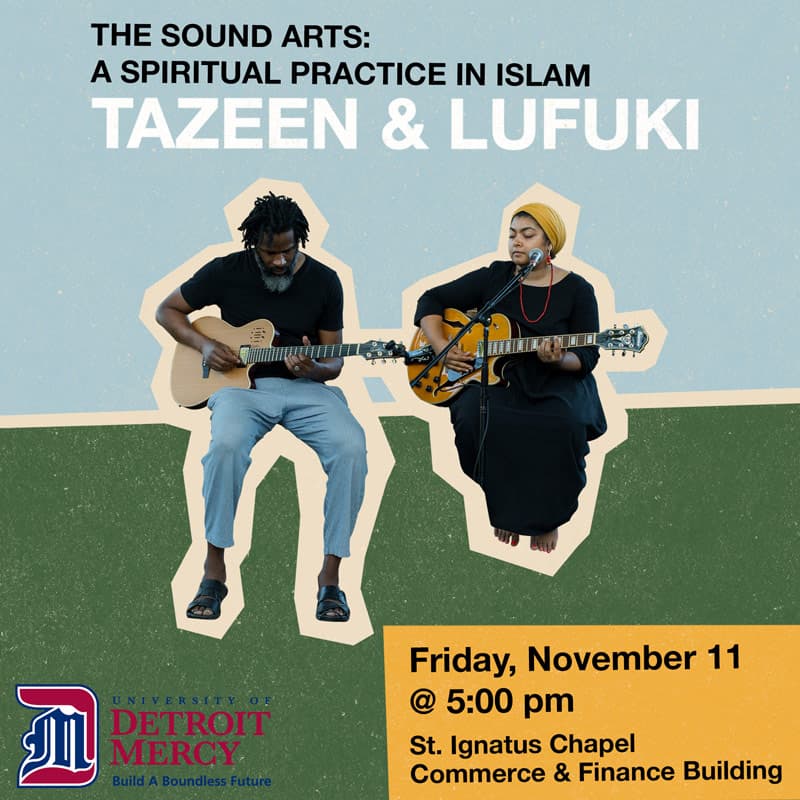
In this session Detroit-based artists, educators, and community organizers Tazeen and LuFuki shared some of their original compositions - grounded in diverse musical traditions such as jazz, funk, Afro-Indian, rock and classical - followed by a discussion on how art can and has been used as a spiritual practice in Islam for generations.
Tazeen and LuFuki are a dynamic musical duo from Detroit that believe music is a sacred art form that can be used for storytelling, healing, solidarity, freedom and social action. Together they formed an afro-spirit sound collective, LuFuki and Divine Providence, and have released four albums: Inner Horizons, Elephants and Mountains, First Light and Love&Light.
They have worked on several projects including, XRoads, a traveling exhibit on the history of Black Muslims in Jazz, and Autophysiopsychic Millennium, a creative research-music collective to explore and experiment with the philosophical writings and compositions Dr. Yusef Lateef left for future generations. They also have served as co-directors for the Detroit chapter of GAMA, Gathering All Muslim Artists, and are the founders of the Sanctuary of Sound, an intimate community space that pairs meditation and music as a spiritual practice and experience.
This event was co-Sponsored by the Office of the Dean, College of Humanities, Arts & Social Sciences; Department of Performing Arts; African American Studies Program; and the Department of Religious Studies.
Water and the Pious Prince: Understanding Medieval Islamic Political Discourse through Hydraulic Architecture, a lecture with Ali Asgar Alibhai, Ph.D.Oct. 13, 2022
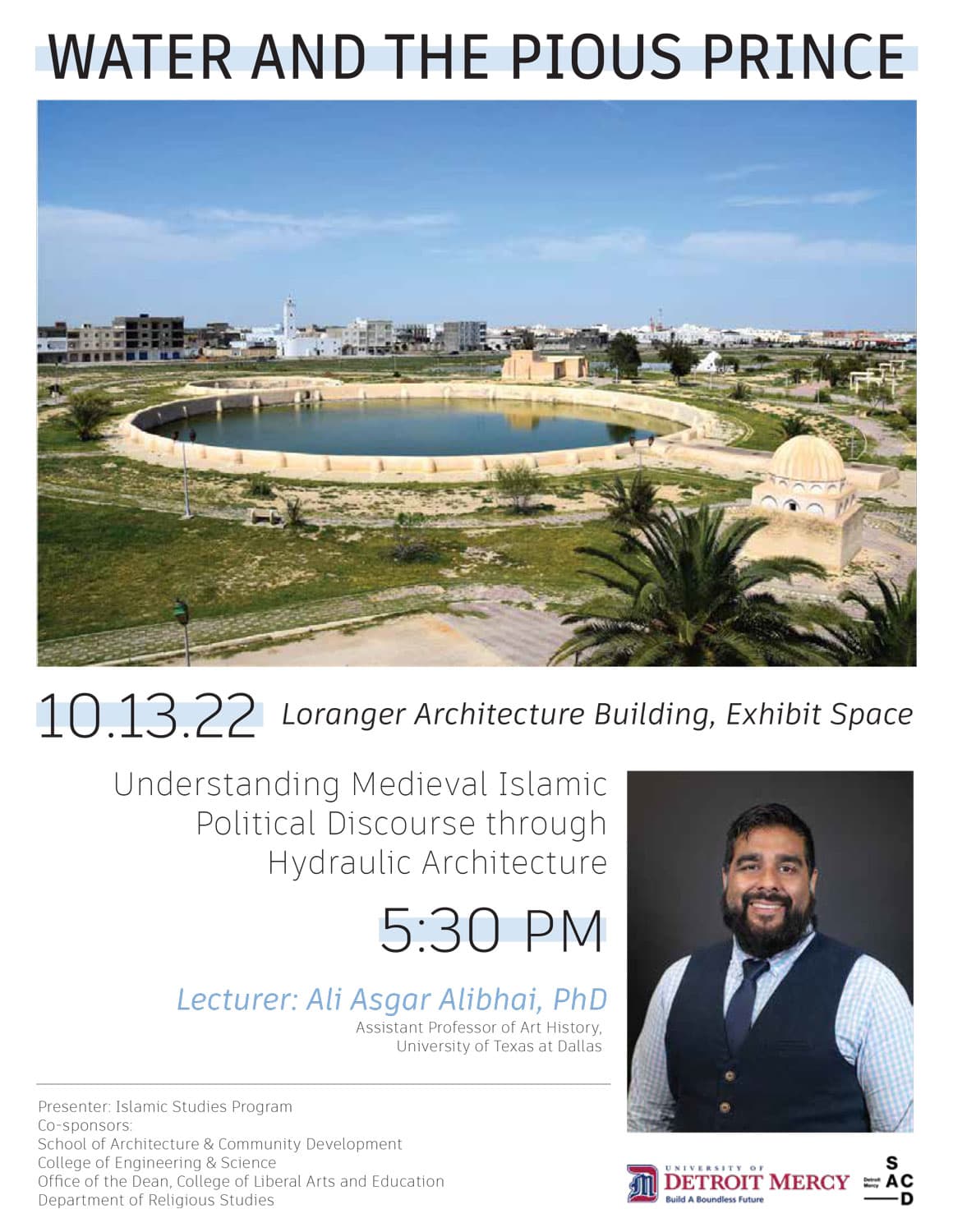
Many regions of the Islamic world existed—and still do—in some of the most arid regions of the habitable world with minimal rainfall. This talk focused on hydraulic engineering and architecture from the medieval Islamic Aghlabid and Fatimid dynasties of Tunisia. It examined environmental history and its connection to both political thought and material culture. These necessary urban constructions were not only built for pragmatic reasons, but their attached historical and art historical data demonstrate a deeply political and religious framework.
Ali Asgar Alibhai, Ph.D. is an assistant professor of art history at University of Texas at Dallas and specializes in the art, architecture, and material culture of medieval Egypt, Tunisia, Sicily, Spain and Morocco. His academic work combines the study of historical texts with art and architectural history to further understand the socio-cultural dynamics of the medieval Islamic world.
This event was co-sponsored by the Office of the Dean at the College of Humanities, Arts & Social Sciences, Department of Religious Studies, School of Architecture & Community Development, and the College of Engineering & Science.
Muslim Pioneers in Detroit: Voices from Historic Masjid Wali MuhammadApril 6, 2022
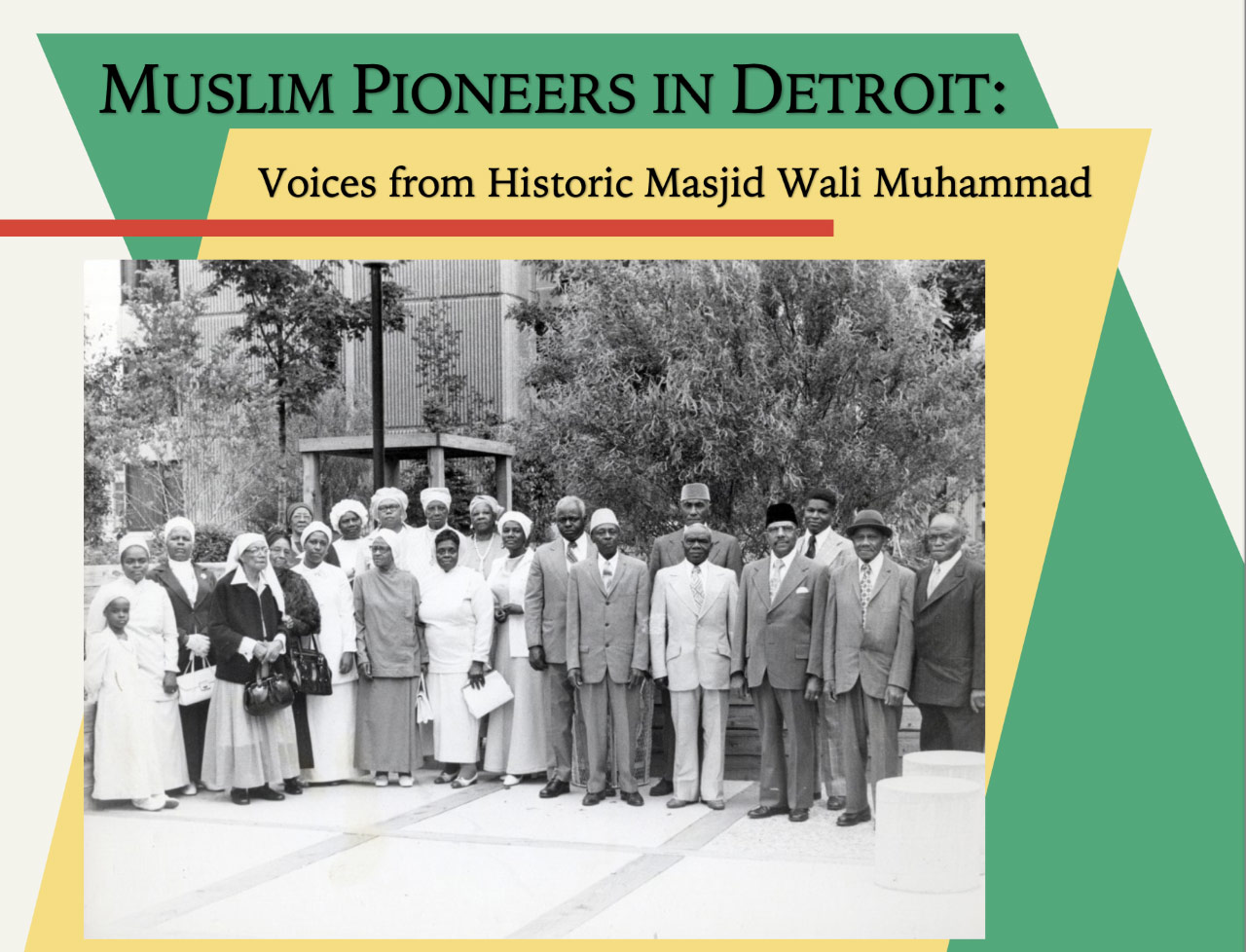
This event included a panel discussion with five senior members of Masjid Wali Muhammad, the oldest continuous African American Muslim community in Detroit since 1930. This was the first place where Malcolm X served as a minister and frequently has hosted famous guests like Muhammad Ali. Panelists shared over eighty years of experience in organizing collective wellbeing through Islam, producing new ideas and practices of Islamic-based education, nutrition, fashion and more. This event illustrated how this nearby mosque has had an incredible influence on Black culture, Islam in America, and more for nearly a century.
This event was co-sponsored by the Department of Religious Studies and the African American Studies Program.
What Makes a Muslim Comedian? A talk with Samah Choudhury, Ph.D.Jan. 21, 2022
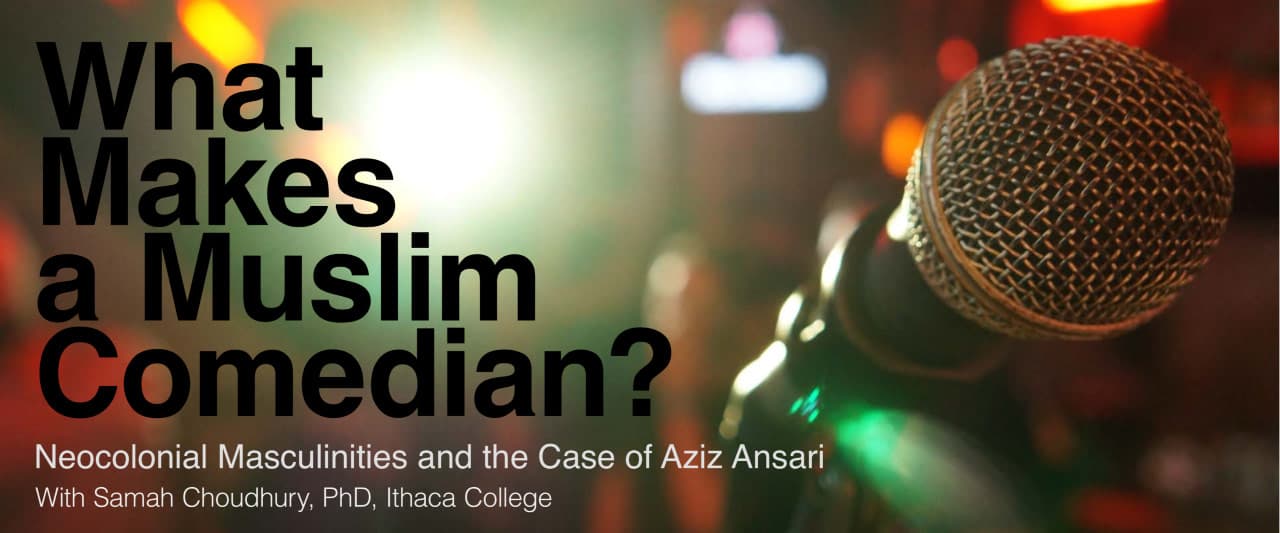
American Muslim comedians like Hasan Minhaj, Kumail Nanjiani and Aziz Ansari are among the most prominent “pop culture Muslims” on the U.S. media landscape today – but why these South Asian men and why now? Through an analysis of these men’s standup routines and other comedy productions, the legibility of Islam is constructed through a racialized triangulation of gender. The Muslim that emerges is a particular kind of Muslim man, diverse and different yet deliberately drawn as separate from the “queer perversities” of other Muslim men and errant hyper-sexualities of associated with Blackness. What does this mean for how the Muslims – and by extension, Islam – are seen and understood across such a precarious cultural terrain?
Samah Choudhury, Ph.D. is assistant professor at Ithaca College in the Department of Philosophy and Religion with a specialization in Islamic studies, humor and comedy, race, and gender.
This event was co-sponsored by the Department of Religious Studies and the Women’s and Gender Studies Program.
Religious Resources
-
Prayer Services
Friday Jum’ah Prayer
The Islamic Prayer Room is located on the first floor of the Student Union on the McNichols Campus, and includes an ablution space. Friday Jum'ah prayer is offered regularly during the school year. Connect with the Muslim Chaplain or the undergraduate Muslim Student Association (MSA) for the most up-to-date times.
There are several additional multifaith spaces on the McNichols Campus for prayer, reflection, quiet time or other spiritual needs.
-
Muslim Student Associations
Muslim Student Association (MSA)
The Muslim Student Association is a group dedicated to spreading knowledge and awareness for Islam, doing community service in the name of Islam, and bringing together people of different cultures and religious backgrounds.
Learn more about how the MSA contributes to interfaith life on campus through an article by student writer Zahra Albdair: "UDM community reflects on faith as religious observances intersect."
Muslim Student Dental Association (MSDA)
Serves as a student organization for dental students to unite regardless of religious beliefs, or other background factors. Our primary goal is to connect dental students. We aim to provide service to our community and promote religious and cultural awareness by means of social and educational events at University of Detroit Mercy.
Muslim Law Students Association
The Muslim Law Students Association (MLSA) is a religious and professional organization of Muslim law students dedicated to the religion of Islam and the legal profession. The MLSA aims to create a community that provides networking and faith-building opportunities.
Donate to the Islamic Studies program
The Islamic Studies program at University of Detroit Mercy is partially supported by an endowment raised from individual donors and institutions in the Muslim community and beyond. Thanks to all of our supporters!
You too can contribute through our secure donation website. Make a one-time gift to impact the growth and development of our students or a recurring gift through smaller, monthly installments of $20, $50, $100 or more to make a significant contribution to the program. Your donation will make a difference.
Instructions
- Visit the online donation page to fill out your donation.
- In the section labeled "Designation" select "Other" at the the bottom of the list. A new box will pop up where you can type in: "Islamic Studies Program."
Program Director
Faculty
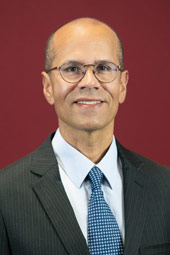
Juan Carlos Flores
Professor of Philosophy
313-993-3318
floresju@udmercy.edu
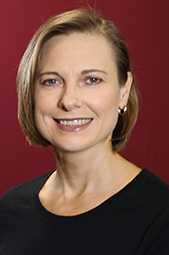
Diane Robinson-Dunn
Associate Professor of History
313-993-1107
robinsod@udmercy.edu
Adjunct Faculty
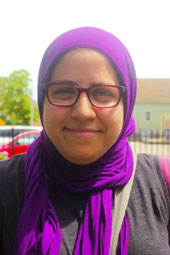
Reem Abou-Samra
Adjunct Faculty Instructor
abousare@udmercy.edu
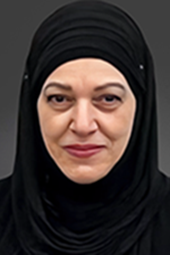
Ghamra Haidar
Adjunct Instructor
haidargg@udmercy.edu
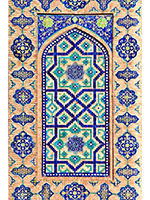
Moustafa Shahin
Adjunct Instructor
shahinmm@udmercy.edu

